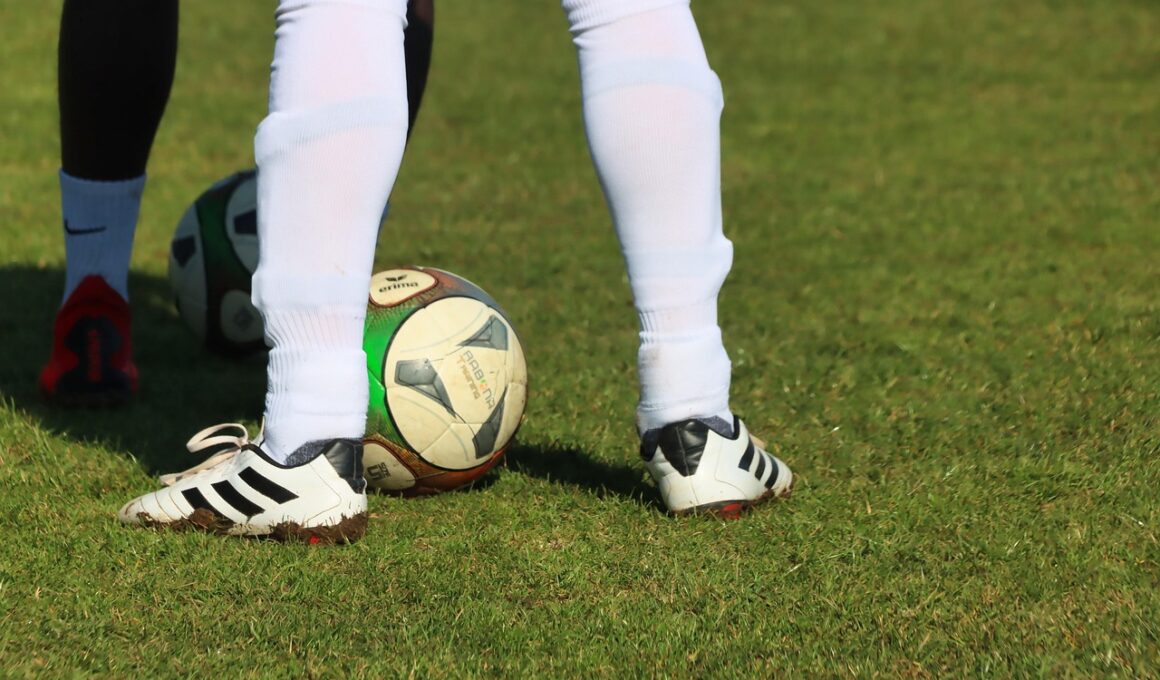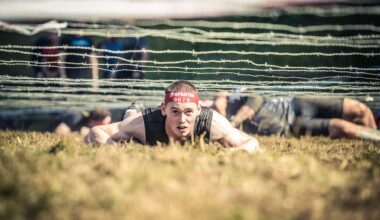Tracking Progress in Football Group Fitness Sessions: Tools and Techniques
In the world of football, tracking progress during group fitness sessions is crucial for players and coaches alike. It allows teams to assess their development, identify strengths, and recognize areas needing improvement. This systematic approach enhances overall performance and fosters teamwork. The right tools can aid this process by providing valuable insights into players’ fitness levels. Implementing fitness tracking tools can be highly beneficial. Wearable technology like fitness bands or smartwatches provides real-time data about heart rate, calories burned, and distance covered. Coaches can analyze these metrics to tailor training sessions accordingly. Additionally, mobile applications dedicated to sports training offer platforms for sharing performance data, fostering a sense of accountability. Players can monitor their achievements over time, leading to increased motivation. Group workouts can transform into competitive environments, encouraging individuals to push their limits. Furthermore, using video analysis tools can help assess movement patterns. Recording training sessions enables coaches to offer feedback, ensuring all players are engaged in skill development while improving fitness. Collaboration and communication between players and coaches are essential for maximizing the benefits of these tools.
Effective Techniques for Monitoring Fitness Progress
Several techniques can enhance progress tracking in football fitness sessions. Regular fitness assessments through standardized tests can provide benchmarks for individual players and the entire group. Examples include shuttle runs, beep tests, or vertical jumps. These tests allow trainers to gauge progress objectively and set achievable goals. Keeping detailed records of these assessments enables coaches to identify trends over time. Moreover, qualitative methods like player interviews and feedback can enrich the data. Understanding how players perceive their fitness levels can add depth to the quantitative data collected. This holistic view allows adjustments in training regimens according to individual needs. Another effective method is to develop specific fitness goals based on previous assessments. Establishing short-term and long-term objectives provides focus and helps players visualize their progress. These goals should be SMART: Specific, Measurable, Achievable, Relevant, and Time-bound. Ensuring that players understand their targets fosters engagement and motivation. Pairing athletes for accountability can create an encouraging training environment. Additionally, incorporating team-building elements can boost morale, making fitness sessions more enjoyable while maintaining focus on progress tracking.
Incorporating technology into football fitness sessions has changed how coaches and players track progress. Digital platforms are particularly useful for sharing information between team members. By using dedicated apps, coaches can collect and distribute performance data without overwhelming players. Most of these applications feature dashboards that offer a visual representation of progress. Players can quickly access their stats, enabling them to see real-time improvements. This fosters a sense of competition within the group, prompting athletes to strive for personal bests. Additionally, regularly scheduled check-ins using these platforms can facilitate productive conversations about individual and team achievements. Monitoring training loads through technology, such as software analytics, is also vital. Coaches can track workouts’ intensity and volume, ensuring players do not become overtrained. This minimizes injury risk while maintaining fitness levels. Furthermore, player-specific adjustments can be made quickly as coaches have access to continuous feedback. The flexibility technology offers allows trainers to tailor each session to everyone’s needs, ranging from beginners to elite players. Using performance tracking tools aids decision-making during group fitness sessions, resulting in more effective training outcomes for each athlete in the team.
Building a Culture of Accountability in Group Sessions
Another critical aspect of tracking progress is fostering a culture of accountability among players. When athletes commit to their own fitness goals, they also support the success of their teammates. This mutual responsibility encourages everyone to perform at their best. Creating a supportive atmosphere during group sessions can instill this sense of accountability. Group discussions about fitness objectives allow athletes to share aspirations, fostering camaraderie. Additionally, motivating each other through friendly competition enhances overall fitness levels. Coaches can further promote this environment by celebrating individual and team achievements, recognizing milestones reached in fitness goals. Tracking progress visually, perhaps through charts displayed in the training facility, can continuously stimulate players’ motivation. When they see their improvements charted, it reinforces efforts. Incentives for reaching specific goals can also be effective in driving engagement. Collaborating on fitness plans encourages communication within the team while generating excitement for training sessions. Regularly scheduling fitness challenges promotes team bonding and accountability. These initiatives ensure that progress tracking is woven into the team culture, ultimately leading to better fitness results and enhanced performance on the field.
Evaluating progress during football group fitness sessions is essential for developing individual performance. Consistent evaluation allows trainers to adjust training as needed. Regularly reviewing fitness data helps identify inefficiencies in training methods or individual performance. Coaches can adjust their strategies based on the findings from progress tracking. Utilizing both qualitative and quantitative approaches ensures a well-rounded evaluation process. Additionally, understanding how players respond to different training stimuli can lead to more effective sessions. Evaluations can extend beyond physical capacities; psychological factors also play a crucial role in athletic development. Coaches should encourage discussions around mental readiness and stress. Players often face strict expectations, leading to anxiety. Creating an open dialogue surrounding mental aspects fosters better-performing athletes. Mental resilience is built alongside physical fitness, particularly during group training sessions. By addressing psychological barriers head-on, coaches can ensure their players are not only physically prepared but also mentally equipped for game day. As a result, evaluations become invaluable tools for comprehensive player development, promoting a strong foundation of skills, fitness, and mental fortitude. This balanced approach significantly improves a team’s overall performance and cohesion during matches.
Ongoing Adaptation and Innovation in Training
As the landscape of sports evolves, so too must the methods for tracking progress in football fitness sessions. Innovative training techniques respond to a rapidly changing environment, particularly regarding technology and scientific advancements. Staying updated with the latest trends allows trainers to implement new strategies for measuring fitness effectively. Adapting current methods to appeal to player preferences ensures compliance and increases participation levels. For instance, integrating gamified elements into fitness training may engage younger athletes. By providing fitness challenges presented in a fun way, players are more likely to be enthusiastic about participating. Additionally, flexible fitness tracking planning allows teams to pivot in response to injury reports, fatigue management, or player availability. Adjustments can be made mid-season or even during training weeks. This adaptability can include varying workout duration and intensity based on players’ needs. Coaches should attend workshops to learn about new tools and technologies for their athletes. Collaborating with sports scientists can yield valuable insights. By staying ahead of the curve, teams maximize player potential, ensuring continued progress tracking remains relevant and beneficial throughout the football season.
In conclusion, tracking progress in football group fitness sessions is essential for player development. The combination of effective tools, techniques, and accountability fosters a comprehensive approach to fitness training. Through technology integration, innovative strategies, and collaborative evaluation, coaches can create an environment where athletes thrive. Adaptability to player needs is vital for sustaining a positive training atmosphere. By continuously monitoring both physical and psychological factors, teams can achieve great success in their fitness objectives. Ongoing discussions about individual growth and teamwork should be encouraged to maintain enthusiasm. Regularly scheduled evaluations help document progress, serving as motivation to improve. Ultimately, the commitment to tracking progress translates directly onto the field, enhancing overall performance during games. The achievements in fitness will reflect in the skills executed during matches, leading to tangible success. Coaches must prioritize the development of their athletes and embrace the efforts made in each group session. Teams equipped with a strategy for progress tracking and evaluation are positioned for excellence throughout the season. Building a culture of accountability and camaraderie can unify players, creating a cohesive unit prepared to face any challenge presented on the pitch.


